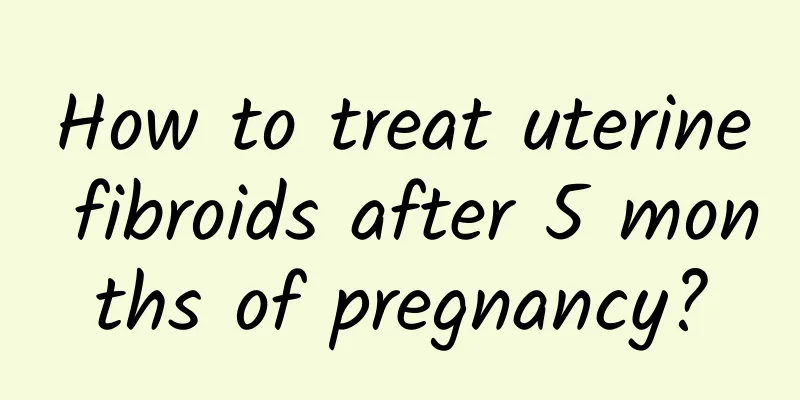How to treat uterine fibroids after 5 months of pregnancy?

|
Today, about one in five women of childbearing age suffers from uterine fibroids, but the vast majority of women discover they have uterine fibroids during early pregnancy and their first prenatal checkup. So, how to treat uterine fibroids after 5 months of pregnancy? Now, uterine fibroids are found after pregnancy, which makes many pregnant women very worried, so how to treat uterine fibroids after 5 months of pregnancy? In fact, the treatment should be determined according to factors such as pregnancy month, fibroid size, clinical manifestations, etc. 1. Treatment of uterine fibroids in early pregnancy: Intervention of uterine fibroids in early pregnancy is likely to lead to miscarriage, so it can be treated in the second trimester. If the fibroids are large, the chance of complications of continued pregnancy is estimated to be greater. If the patient requires an artificial abortion, the pregnancy can be terminated first, the fibroids can be removed in the short term, or an artificial abortion can be performed at the same time. 2 Treatment of uterine fibroids in mid-pregnancy: ① For those with fibroids less than 6 cm in diameter and no symptoms, most prenatal examinations do not require special treatment; ② The diameter of the fibroid is greater than 6 cm. As the uterine fibroid grows, it may continue to increase. Large fibroids are prone to red samples stimulating uterine contractions or peritoneal irritation symptoms. At this time, obstetricians only recommend that patients rest in bed and use analgesics for conservative treatment. Myomectomy during pregnancy is rarely recommended, only when necessary. 3 Treatment of uterine fibroids in late pregnancy: Small fibroids cannot be treated. If the fibroid diameter is larger than 8cm but there are no symptoms, you can wait until full-term cesarean section and perform uterine fibroid removal at the same time. Because large uterine fibroids may not only affect uterine contraction and production abnormalities, but also the possibility of postpartum placental retention, postpartum hemorrhage and postpartum infection is greater than that of normal pregnant women. In some cases, the uterus may also be forced to be removed due to postpartum hemorrhage or postpartum infection. |
<<: Can I still get pregnant if I have an ovarian cyst? What is the cause?
Recommend
What are some ways to prevent bacterial vaginosis?
Bacterial vaginosis is a common gynecological dis...
Is konjac noodles a magic tool for weight loss? Nutritionist: Eat this together to lose weight
There are many ways to lose weight, but there are...
How much does artificial abortion cost
The cost of an abortion ranges from a few hundred...
Can I drink red wine if I have pelvic inflammatory disease? No
You cannot drink red wine when you have pelvic in...
Why can't candidal vaginitis be cured in the long term?
Why can't candidal vaginitis be cured in the ...
Sitting makes you fat! 3 ways to break down excess fat
Office workers have many problems due to long per...
What is the most effective way to relieve menstrual pain?
Generally, there is no most effective way to reli...
Which hospital is good at diagnosing uterine effusion?
Uterine effusion is a manifestation rather than a...
What causes bacterial vaginosis to recur?
Bacterial vaginosis is a common vaginal gynecolog...
Precautions for miscarriage in three months of pregnancy
Pregnancy is a very important thing for women. We...
Should cervical polyps be removed after menopause?
After menopause, cervical polyps need to be remov...
How does vaginal candidiasis occur?
How does vaginal candidal infection occur? Vagini...
Clinical examination of bacterial vaginosis
Women need to pay attention to some conditioning ...
How to treat menopausal uterine fibroids? What are the traditional Chinese medicine treatments for uterine fibroids?
Menopausal uterine fibroids are a high-incidence ...
Why can’t I lose weight? Experts share 6 weight loss diet tips to keep slim and avoid gaining weight again
The secret of staying slim and not gaining weight...









